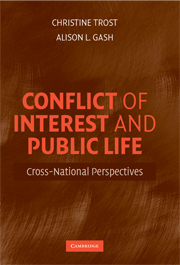Book contents
- Frontmatter
- Contents
- About the Contributors
- Acknowledgments
- Conflict of Interest and Public Life
- Introduction
- PART I THEORETICAL FRAMEWORKS
- PART II CROSS-NATIONAL CASE STUDIES
- FIVE Conflict-of-Interest Legislation in the United States: Origins, Evolution, and Inter-Branch Differences
- SIX Conflict of Interest in Canada
- SEVEN Conflict of Interest in British Public Life
- EIGHT Conflict of Interest in Italy: The Case of a Media Tycoon Who Became Prime Minister (2001–2006)
- NINE Conclusion: Conflict-of-Interest Regulation in Its Institutional Context
- Bibliography
- Index
SEVEN - Conflict of Interest in British Public Life
Published online by Cambridge University Press: 31 October 2009
- Frontmatter
- Contents
- About the Contributors
- Acknowledgments
- Conflict of Interest and Public Life
- Introduction
- PART I THEORETICAL FRAMEWORKS
- PART II CROSS-NATIONAL CASE STUDIES
- FIVE Conflict-of-Interest Legislation in the United States: Origins, Evolution, and Inter-Branch Differences
- SIX Conflict of Interest in Canada
- SEVEN Conflict of Interest in British Public Life
- EIGHT Conflict of Interest in Italy: The Case of a Media Tycoon Who Became Prime Minister (2001–2006)
- NINE Conclusion: Conflict-of-Interest Regulation in Its Institutional Context
- Bibliography
- Index
Summary
The United Kingdom offers an instructive case study for examining many of the theoretical and normative issues that arise in relation to conflict of interest in the modern state. In this chapter we explore the evolution of the conflict-of-interest debate in the United Kingdom and explain why it remains such an intractable problem in modern British politics. Reflection on British efforts to wrestle with this multi-faceted problem may be instructive for other systems. We suggest that the British case raises some fundamental questions about the costs and benefits of existing approaches to the regulation of conflict of interest and about wider issues of democratic accountability.
The United Kingdom also provides a useful case study for comparative work as Britain has moved very quickly from a situation in which informal systems of socialization and self-regulation were the dominant mode of ethics regulation to one in which institutionalized codes with independent oversight have become paradigmatic. This must bring into question any suggestion that cross-national variations among modes of ethics regulation are simply reflective of differences in underlying political structures.
Britain possesses a highly centralized system of political control (albeit one that has experienced profound constitutional change over the past decade). Two implications of this will become apparent: first, ethics reform has largely been directed from the pinnacle of the core executive. Unlike states in which power is separated and shared, the U.K. executive is in a strong position to impose ethics reform on other branches.
- Type
- Chapter
- Information
- Conflict of Interest and Public LifeCross-National Perspectives, pp. 155 - 187Publisher: Cambridge University PressPrint publication year: 2008
- 1
- Cited by



